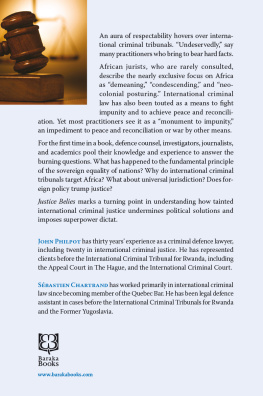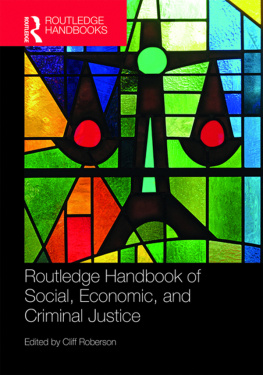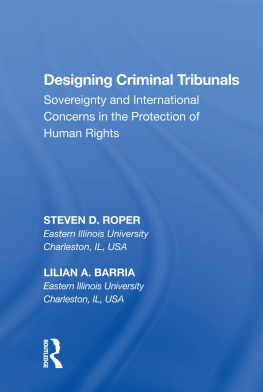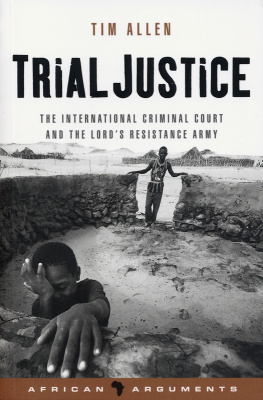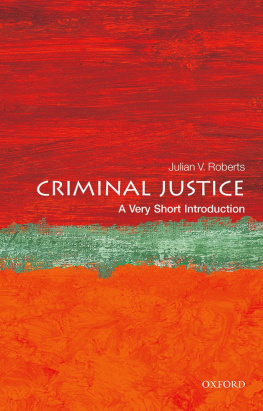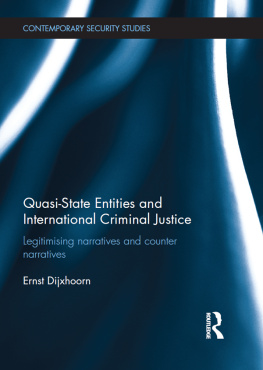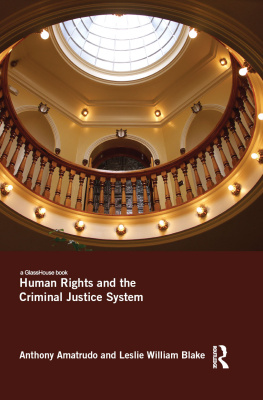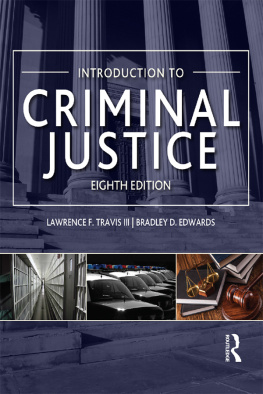FDLR Forces dmocratiques pour la libration du Rwanda (Democratic Forces for the Liberation of Rwanda)
MICT Mechanism for International Criminal Tribunals or International Residual Mechanism for International Criminal Tribunals
Introduction
The reality of International Criminal Law is virtually unknown to the general public. Yet International Criminal Law enjoys an aura of respectabilitytotally unwarranted in the eyes of many of our authorsand this aura creates an illusion that its judgments are reliable and at last tell us the truth about events in different parts of the world. The book you are about to read represents the first attempt by defence counsel, investigators, journalists, academics, attorneys, and experienced observers to shed light on the issues, problems, and injustices that International Criminal Law has raised, particularly over the past twenty years.
Judicial history can be written by the study of judgments, proclamations, tribunal statutes, and other tribunal legislation. We consider that the reality of International Criminal Law can be best understood and explained by those intimately involved, particularly from the defence point of view. The trials and tribulations of our clients, many of whom have been wrongly convicted, are at the heart of our work. We are all inspired by the high ideals of justicethe right to life, the right to full answer and defence, impartiality of justice where no one is above the law, where rich and poor, black and white are treated equally, and where guilt can only be determined when credible evidence overwhelmingly dictates the only verdict possible. Many of us are also inspired by a desire to bring about a better world that will respect all the worlds peoples and their right to self-determination, thereby leading to an equitable sharing of wealth.
International Criminal Law has been overwhelmingly focused onsome would say foisted uponAfrica and Africans, yet rarely do we hear or read the points of view of Africans, be they from Africa or from the diaspora. The first section is thus entitled International Justice in the Eyes of Africans and African Americans. Chief Charles Taku, an experienced defence counsel from Cameroun, addresses both problems of discrimination and serious legal problems raised at the International Criminal Tribunal for Rwanda and the International Criminal Court. In two other articles, he discusses the questionable practices and verdicts in the Charles Taylor case and then raises a red flag about the political consequences of the ICCs involvement in Kenya.
Glen Ford, a reputed African-American journalist and executive editor of the Black Agenda Report, takes on the taboo about the United States dominant role in international law and politics in Africa.
Former Rwandan presidential candidate Ms. Victoire Ingabire Umuhoza, now in prison in Rwanda, has been compared to Mandela. Joseph Buckeye, former ICTR investigator, provides essential information on her trial and sentencing comparing it to Pinochet-style repression. Theogne Rudasingwa was Rwandan President Paul Kagames Chief of Staff and also Rwandas Ambassador to the United States. His paper focuses on justice and Rwanda over the long term. Leopold Nsengiyumva, an experienced ICTR defence investigator, sheds light on startling and much too common cases of fabrication of evidence at the ICTR.
Phil Taylor, journalist, broadcaster, and long-time ICTR investigator, provides sharp insight into the very nature of the ICTR, which Ramsey Clark has described as war by other means. Whereas courts are expected to provide reliable jurisprudence and precedents for future cases, Philippe Larochelle, an experienced defence counsel, casts doubt on the reliability of the dark jurisprudence resulting from ICTR trials. Andr Sirois is an attorney and UN legal translator who was involved in what he describes as the bad beginnings of the ICTR. His observations will surprise readers. Beth Lyons, a leading ICTR defence counsel, addresses and analyses disclosure problems at the ICTR, which make final judgments both unfair and untrustworthy.
Jordi Palou Loverdos, from Catalonia, Spain, was one of the driving forces behind Spains application of universal jurisdiction in criminal law and the development of alternative methods of reconciliation and peace following massive human rights violations. His article provides essential information and background on that initiative. Malaysia set up the Kuala Lumpur War Crimes Tribunal in 2006 based on the principle of universal jurisdiction. In an interview, Professor Michel Chossudovsky of the Centre for Research on Globalization and a founder of that Tribunal describes the challenges involved and the Tribunals achievements.
In the final section entitled Justice for All? Professor Fannie Lafontaine and Erick Sullivan of Universit Laval address the future of International Criminal Law and see some positive developments. On the other hand, Toronto lawyer and ICTR defence counsel David Jacobs offers readers a dedication to the late Michael Mandel, a pioneering scholar in international criminal law who passed away on October 27, 2013. Professor Mandel held that the international criminal law movement had delegitimised and marginalised the United Nations and effectively regulated, even legitimated, the use of violence in international affairs.
In two articles, John Philpot, defence counsel at the ICTR and the ICC, submits first that the ICTRs heritage is seriously flawed, and second that in general International Criminal Law tribunals are moulded to comply with, and aid and abet, United States foreign policy.
We hope this contribution based on our first-hand experience will be a useful tool to understanding the flaws in the International Criminal Law process and provide insight for the future and the creation of a just international order.
PART I
International Criminal Justice in the Eyes
of Africans and African Americans
1
African Court and International Criminal Courts:
Discriminatory International Justice and the Quest
for a New World Judicial Order
Chief Charles A. Taku
Introduction
The idea of establishing a standing international criminal court to investigate and prosecute international crimes as a significant component of the worlds effort to safeguard world peace and security was first raised unsuccessfully by the Russian delegate at the first and second World Peace Conferences in 1899 and 1907. Africa was not then considered a subject of international law. To Western European imperial powers, Africa was a vast slave plantation that they apportioned among themselves at the so-called Berlin Conference in 1884. For that reason, Africa was not represented and its interests were not protected at the first and second World Peace Conferences.

